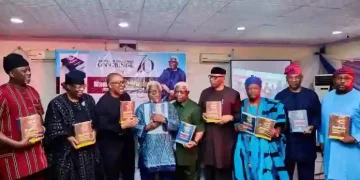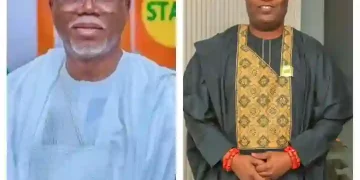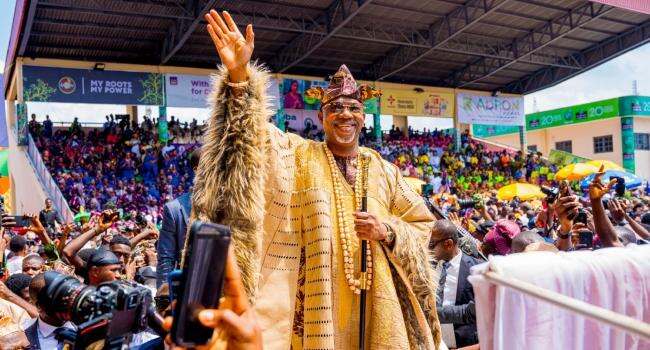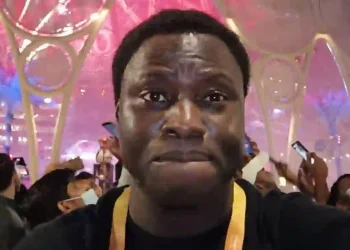The 2025 Ojude Oba Festival, a cherished cultural heritage of the Ijebu people spanning over 150 years, was meant to be a celebration of unity, tradition, and reverence for the Awujale of Ijebuland, Oba Sikiru Kayode Adetona. Instead, it became a stage for political grandstanding, sparking outrage among indigenes who accused Governor Dapo Abiodun of desecrating their sacred tradition by turning the event into “Ojude Dapo Abiodun.”
Traditionally, the high point of the Ojude Oba Festival is the homage paid by the Regberegbes (age-grade societies) to the Awujale and other Ijebu monarchs. However, this year, Governor Abiodun shockingly assumed the role of a quasi-monarch, receiving salutations from the age grades, a duty exclusively reserved for the Awujale or his appointed traditional representatives.
Many Ijebu leaders and elders viewed this as a brazen usurpation of royal authority. “Is Dapo Abiodun now an Oba?” an angry chief asked rhetorically. “By what authority did he stand in the place of Kabiyesi? This is an insult to our heritage.”
Awujale’s Absence: A Festival That Should Have Been Sombre
The absence of the Awujale, who was indisposed due to health concerns, should have cast a reflective tone over the celebrations. Instead, Governor Abiodun turned the event into a self-celebratory spectacle, seizing photo opportunities and basking in the spotlight while sidelining concerns for the ailing monarch.
“A true leader would have shown empathy,” remarked a prominent Ijebu businessman. “Other dignitaries made brief appearances and retired to pray for Kabiyesi’s recovery. But the governor acted as if the festival was about him.”
Who Should Have Represented the Awujale?
In the absence of the paramount ruler, tradition dictates that either the Otunbas, high chiefs, or other crowned Obas in Ijebuland should stand in for the Awujale. Governor Abiodun, however, bypassed these custodians of culture and installed himself as an “emergency Awujale,” a move widely interpreted as a calculated political stunt.
“There are traditional protocols,” a palace source emphasized. “If the governor wanted to participate, he should have sat among the dignitaries, not rewrite our customs for his own agenda.”
Underlying Tensions: Ijebu State Agitation and Remo-Ijebu Relations
Beyond the festival, sources within the Awujale’s inner circle suggest that the monarch’s absence was not solely health-related but also a silent protest against Governor Abiodun’s handling of Ijebu-Remo relations, particularly regarding the push for an Ijebu State.
“The Kabiyesi is deeply unhappy,” an insider revealed. “Previous administrations maintained harmony between Ijebu and Remo, but this governor has introduced unnecessary divisions for political gain.”
Ijebu Youths and Elders React: “Respect Our Culture!”
The backlash has been swift, with many Ijebu youths and elders taking to social media and community gatherings to express their displeasure. Some have even invoked traditional curses, accusing the governor of bringing “a curse upon himself” for disrespecting their heritage.
“Ojude Oba is not a political rally,” a youth leader declared. “We will not allow our traditions to be trampled upon for cheap publicity.”
A Call for Restraint and Respect
As the dust settles, the message from Ijebuland is clear: Governor Abiodun must refrain from politicizing their sacred festival. The Ojude Oba is a celebration of history, identity, and reverence for the throne—not a platform for self-aggrandizement.
Moving forward, stakeholders are demanding an immediate return to tradition, warning that any further erosion of cultural values will be met with fierce resistance. For now, the question lingers:
Will Governor Abiodun heed the voice of the Ijebu people, or will the 2026 Ojude Oba become another chapter in this troubling politicisation of heritage?
Leadership is not just about governance; it is about respect for the people’s history and traditions. Governor Abiodun would do well to remember that no political ambition is worth the alienation of an entire kingdom.





















